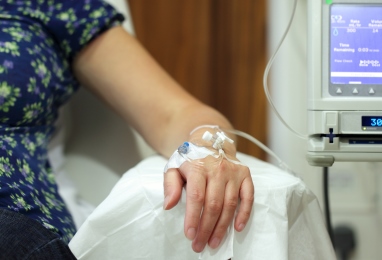23 November 2015
 It’s not well known, but one of the leading causes of death for patients receiving chemotherapy is not the cancer itself, but blood clots.
It’s not well known, but one of the leading causes of death for patients receiving chemotherapy is not the cancer itself, but blood clots.
Clots are a common but unwanted consequence of treatments that use straw-like catheters to deliver chemotherapy drugs into a patient’s veins.
If, and when the clots break away they can cause strokes or other dangerous health impacts.
But a breakthrough innovation to tackle the problem has come from the field of nursing.
University of South Australia researcher, lecturer in nursing, and former clinical practitioner in thoracic medicine, Rebecca Sharp, has devised a simple new technique that reduces the development of clots and is saving patient lives.
“My research has shown that the simple act of finding a vein of the appropriate size before inserting the delivery device can make all the difference to patient safety,” Sharp says.
Using ultrasound to study vein size in patients receiving hospital treatment for cancer, Sharp found that to reduce the risk of clotting, the intravenous delivery device should occupy less than 45 per cent of the selected vein width.
“Taking up more of the vein increases the risk of a blood clot by more than tenfold,” she says.
“All the textbooks suggest veins are kind of a regular, average size but, just as we all vary in shoe size, our vein size is considerably varied too.
“The vein which is typically thought of as being the biggest is only so in about half the people receiving treatment.”
Sharp says introducing a care protocol that ensures all patients are assessed to find the right sized vein before chemotherapy commences can make a huge difference to patient care and survival.
“It is only a six-minute assessment procedure for most patients – six minutes that we know are incredibly valuable,” Sharp says.
Rebecca’s findings have already made their way into the broader hospital setting, and are now part of the training provided to both nurses and doctors in main teaching hospitals in Adelaide.
Media contact: Michèle Nardelli office +61 883020966 mob 0418823673 email michele.nardelli@unisa.edu.au


